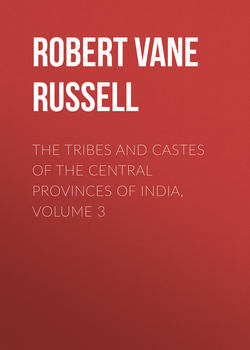Читать книгу The Tribes and Castes of the Central Provinces of India, Volume 3 - Robert Vane Russell - Страница 74
Gond
(f) Religion
56. The Karma and other rites
ОглавлениеDuring Bhādon (August), in the rains, the Gonds bring a branch of the kalmi or of the haldu tree from the forest and wrap it up in new cloth and keep it in their houses. They have a feast and the musicians play, and men and women dance round the branch singing songs, of which the theme is often sexual. The dance is called Karma and is the principal dance of the Gonds, and they repeat it at intervals all through the cold weather, considering it as their great amusement. A further notice of it is given in the section on social customs. The dance is apparently named after the tree, though it is not known whether the same tree is always selected. Many deciduous trees in India shed their leaves in the hot weather and renew them in the rains, so that this season is partly one of the renewal of vegetation as well as of the growth of crops.
Climbing the pole for a bag of sugar
In Kunwār (September) the Gond girls take an earthen pot, pierce it with holes, and put a lamp inside and also the image of a dove, and go round from house to house singing and dancing, led by a girl carrying the pot on her head. They collect contributions and have a feast. In Chhattīsgarh among the Gonds and Rāwats (Ahīrs) there is from time to time a kind of feminist movement, which is called the Stiria-Rāj or kingdom of women. The women pretend to be soldiers, seize all the weapons, axes and spears that they can get hold of, and march in a body from village to village. At each village they kill a goat and send its head to another village, and then the women of that village come and join them. During this time they leave their hair unbound and think that they are establishing the kingdom of women. After some months the movement subsides, and it is said to occur at irregular intervals with a number of years between each. The women are commonly considered to be out of their senses.
